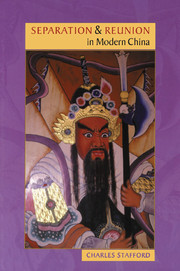Book contents
- Frontmatter
- Contents
- Acknowledgements
- Introduction: an anthropology of separation
- 1 Two festivals of reunion
- 2 The etiquette of parting and return
- 3 Greeting and sending-off the dead
- 4 The ambivalent threshold
- 5 Commensality as reunion
- 6 Women and the obligation to return
- 7 Developing a sense of history
- 8 Classical narratives of separation and reunion
- 9 The politics of separation and reunion in China and Taiwan
- Conclusion: the separation constraint
- Notes
- References
- Index
1 - Two festivals of reunion
Published online by Cambridge University Press: 22 September 2009
- Frontmatter
- Contents
- Acknowledgements
- Introduction: an anthropology of separation
- 1 Two festivals of reunion
- 2 The etiquette of parting and return
- 3 Greeting and sending-off the dead
- 4 The ambivalent threshold
- 5 Commensality as reunion
- 6 Women and the obligation to return
- 7 Developing a sense of history
- 8 Classical narratives of separation and reunion
- 9 The politics of separation and reunion in China and Taiwan
- Conclusion: the separation constraint
- Notes
- References
- Index
Summary
I'll begin my discussion of the separation constraint in China and Taiwan by relating what happens at an ‘obviously’ important moment: namely midnight on new year's eve. For although the Chinese lunar calendar (yueli, nongli) has no shortage of significant and celebrated occasions, by far the most elaborate and extended celebrations are prompted by the ‘turning of the year’ (guonian) – i.e. the passage into the next annual cycle. And as I'll show in this chapter, the new year festival, with its solemn rituals and raucous banqueting, explicitly and repeatedly celebrates the ideals of ‘unity’ and ‘reunion’. It elaborates, on some levels, a fantasy of perpetual ‘non-separation’, and its key moment entails reunification with the dead. This is also true of the important festival marking the arrival of ‘mid-autumn’ (zhongqiu), which I will also discuss. But I should stress that the emphasis of these two festivals on reunion is far from unique. For as Göran Aijmer has pointed out, the entire Chinese ceremonial calendar is built around reciprocal visits, especially those between ancestors and descendants (Aijmer 1991). Such visits – marked off by rituals of arrival and departure – inevitably highlight ongoing reciprocity and ‘unity’ in the face of death and spatial separation.
Calendrical festivals are thus my first, perhaps rather obvious and public, evidence that processes of separation and reunion are a matter of concern in China.
- Type
- Chapter
- Information
- Separation and Reunion in Modern China , pp. 30 - 54Publisher: Cambridge University PressPrint publication year: 2000



